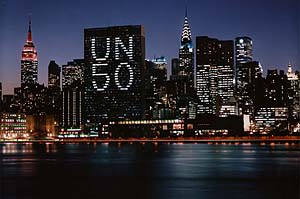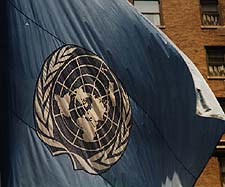Countries of the world are getting together to talk...talk and talk some more! But they talk in a language that is their own, and the UN process might as well be a complete foreign language. So how did this all begin, anyways?
|
Countries of the world are getting together to talk...talk and talk some more! But they talk in a language that is their own, and the UN process might as well be a complete foreign language. So how did this all begin, anyways?
|

What's happening now?
- This week the UN is holding a special session of the general assembly, (called Earth Summit +5) to see if any of the rules in Agenda 21 have actually been followed.
- So, this event is acting as a report card evaluation time, but governments will also draft new ideas and sign documents promising change.
On the way to New York
Not everything is debated and decided on in one week. This process began over a year ago with a few steps along way:
Step 1 - Meetings of people around the world on hot topics; forests was one of them.
Step 2 - In February, a working group met to decide what would be talked about now, in June. Meetings to talk about meetings: it's a vicious cycle...
Step 3 - At the same time, some countries may have had their own meetings.
Step 4 - In April, everyone met and dumped all their ideas into one document (a really long essay full of recommendations). This is the physical document being debated right now. It's called: The Commission on Sustainable Development.
How do you get the world to agree?
Before anything is signed and becomes official, everyone has to agree (called a consensus). The final product at the end of the week is a consensus document. This is a lot harder to do than it sounds. Think about how hard it is to get your friends to agree on what movie they want to see, or where they want to go to dinner.
If there's something that a government doesn't agree on, they pick it out, talk about it, debate it and then try to rework it so everyone is happy. While this is going on, people that aren't government try to persuade the officials to vote the way they want them to. These people, called lobbyists or NGOs, are trying to convince the people who vote, to vote the way they want. You know, it's like trying to convince your parents to buy that cool new stereo that you like, but they still have the final word.
At the start of this Earth Summit, 80 per cent of the document had already been agreed upon. With 20 per cent left to agree on, it gives you some indication of just how much talking is going on.
Whatever is not okay'd by everyone, is taken out. So, everyone is happy!
So who makes the decisions?
Government delegations negotiate their countries position on a certain issues. If one country does not agree with a word in a statement it remains bracketed until alternative text is created that will satisfy all participants. To cover all the issues in such a limited time there are working groups that governments form on certain issues to resolve disagreements.
Will it work?
The United Nations is not a government and it doesn't have its own police force. As an organization, it tries to make and enforce solutions, but because there are no police, it's kind of hard. Whether or not things actually get done, is up to the individual countries.
I guess we'll have to wait and see...
